Telogen Effluvium is a temporary hair loss condition that affects many people, both men and women. A variety of factors, including stress, hormonal imbalances, nutritional deficiencies, and medications can trigger it. Although Telogen Effluvium is not a severe medical condition, it can be distressing for those who experience it. In this comprehensive guide, we’ll explore the symptoms, causes, and treatment options of Telogen Effluvium, and provide you with strategies to manage and prevent it.
What is Telogen Effluvium?
Telogen Effluvium is a temporary hair loss condition that occurs when more hair follicles than usual enter the resting (telogen) phase of the hair growth cycle, leading to increased shedding or thinning of hair. This condition is common and usually resolves on its own within 6-12 months, although in some cases it can persist or recur.
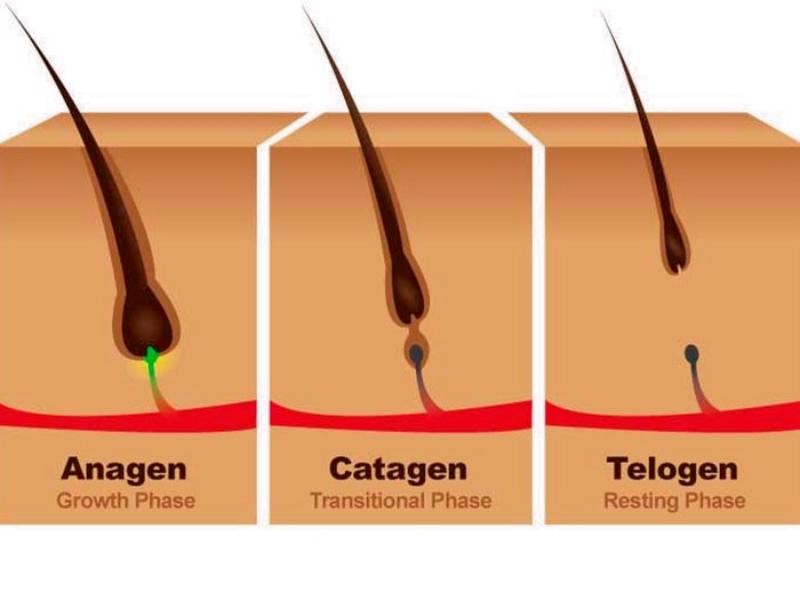
The hair growth cycle consists of three phases: anagen (the active growth phase), catagen (the transitional phase), and telogen (the resting phase). During the telogen phase, the hair follicle remains dormant for several months before a new hair shaft begins to grow and the cycle starts over.
Although Telogen Effluvium is not a life threateningmedical condition, it can be distressing for those who experience it. It is important to understand the symptoms, causes, and treatment options of Telogen Effluvium to effectively manage it.
Acute Telogen Effluvium
Acute Telogen Effluvium is a form of Telogen Effluvium that occurs suddenly and is typically triggered by a traumatic event. This type of hair loss can be caused by a variety of factors, including surgery, childbirth, severe illness, or emotional stress.
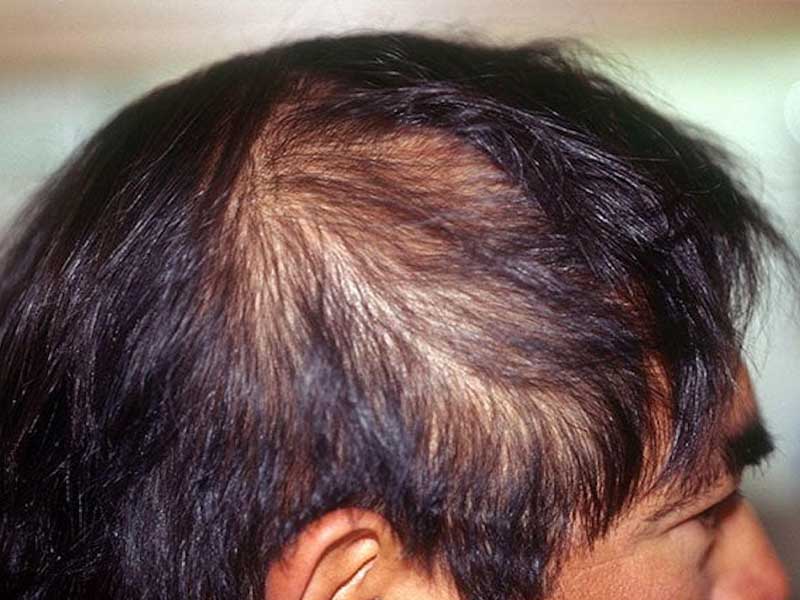
Symptoms of Acute Telogen Effluvium include sudden hair loss or shedding, which can be alarming for those experiencing it. However, the good news is that this type of hair loss is usually temporary and can be managed with proper care and treatment.
Chronic Telogen Effluvium
Chronic Telogen Effluvium is a long-term form of Telogen Effluvium that causes ongoing hair shedding or thinning. Unlike Acute Telogen Effluvium, which typically resolves within a few months, Chronic Telogen Effluvium can last for several years.
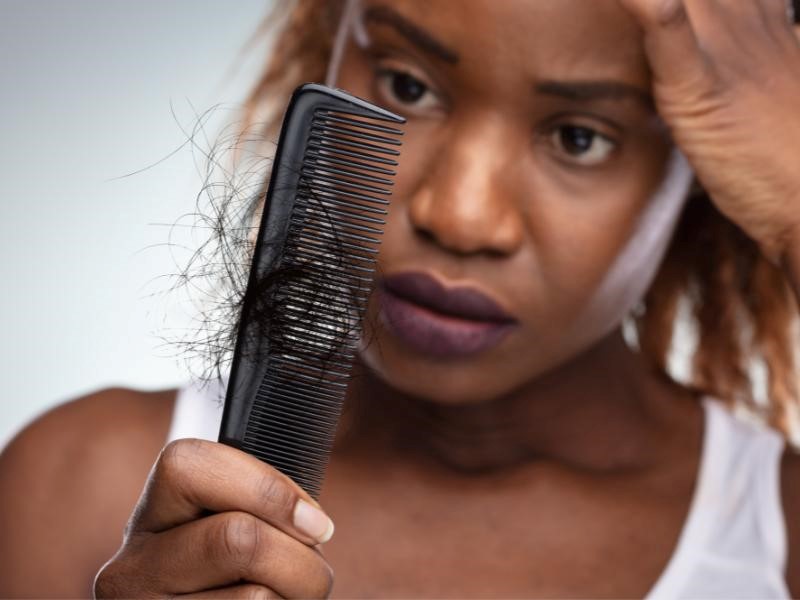
While the exact causes of Chronic Telogen Effluvium isnot fully understood, several factors have been identified that may contribute to its development. These include hormonal imbalances, nutritional deficiencies, and autoimmune disorders.
Telogen Effluvium in Men
Telogen Effluvium is a type of hair loss that can affect both men and women. However, there are some differences in how Telogen Effluvium is present in male compared to female patients.

In men, Telogen Effluvium can be caused by a variety of factors, including stress, illness, hormonal changes, and medication use. Some men may also be genetically predisposed to Telogen Effluvium, as male pattern baldness can be a contributing factor.
The symptoms of Telogen Effluvium in men are similar to those in women. Men may notice a sudden thinning of the hair, particularly on the top of the scalp. They may also notice an increase in shedding or a loss of hair density.
While Telogen Effluvium can be distressing for men, it is usually a temporary condition that can be managed with proper care and treatment.
Signs & Symptoms of Telogen Effluvium
Hair-shedding patterns are often the first sign of Telogen Effluvium. You may notice an increase in hair shedding when you brush or wash your hair, or you may see more hair on your pillow in the morning. This shedding can last for several weeks or even months. Other common symptoms of Telogen Effluvium include:
- Hair shedding patterns: Increased shedding of hair is one of the hallmark symptoms of Telogen Effluvium. People with this condition may notice more hair falling out than usual when brushing or washing their hair, or even notice hair shedding throughout the day.
- Thinning of hair: Telogen Effluvium can cause the hair to look thinner and less voluminous. The thinning may be diffuse or more prominent in certain areas of the scalp.
- Visible hair loss: In severe cases of Telogen Effluvium, there may be noticeable patches of hair loss on the scalp. This is less common than diffuse thinning.
- Decrease in hair density: Telogen Effluvium can lead to a decrease in overall hair density, which means that there may be fewer hair strands per square inch of the scalp.
- Change in hair texture: People with Telogen Effluvium may notice changes in their hair texture, such as increased dryness or brittleness.

It is worth mentioning that the severity of these symptoms varies and that they do not always occur in cases of Telogen Effluvium. Additionally, it’s important to consult with a dermatologist or hair specialist if you are experiencing hair loss or shedding, as there may be other underlying causes that require different treatment strategies.
Telogen Effluvium: Causes
Telogen Effluvium is a temporary hair loss condition that can be caused by a variety of factors. Understanding the underlying causes of Telogen Effluvium is crucial for the proper management and treatment of the condition. Here are some common causes of Telogen Effluvium:
- Physical or emotional stress: Stressful events such as a major surgery, a serious illness, or a significant life changing events can trigger Telogen Effluvium. This is because stress can disrupt the hair growth cycle and cause more hair follicles to enter the resting (telogen) phase, leading to increased hair shedding.
- Hormonal changes: Hormonal fluctuations during pregnancy, menopause, or thyroid disorders can also contribute to Telogen Effluvium. These hormonal changes can alter the hair growth cycle and lead to increased shedding or thinning of hair.
- Nutritional deficiencies: A diet lacking essential nutrients such as iron, zinc, and biotin can contribute to Telogen Effluvium. These nutrients are crucial for healthy hair growth, and a deficiency can disrupt the hair growth cycle and lead to increased shedding.
- Medications: Certain medications such as anticoagulants, beta-blockers, and retinoids can cause Telogen Effluvium as a side effect. Additionally, chemotherapy drugs can lead to temporary hair loss during treatment.
- Medical conditions: Telogen Effluvium can also be a symptom of underlying medical conditions such as autoimmune disorders or thyroid disorders.
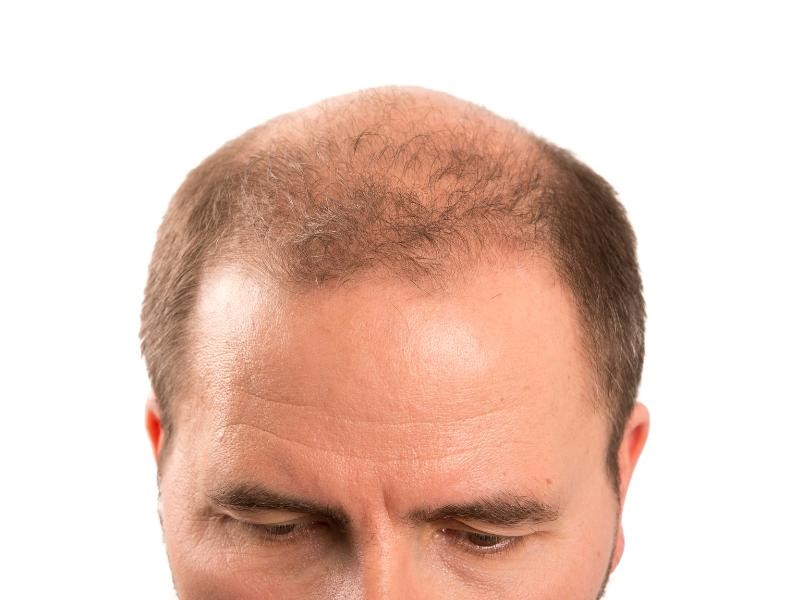
Note that Telogen Effluvium can result from various factors, and it can be difficult to determine the underlying cause. Nevertheless, seeking advice from a dermatologist or hair specialist can aid in identifying the cause and prescribing the appropriate treatment options.
Telogen Effluvium Treatment Options
Telogen Effluvium Treatment typically involves addressing the underlying cause of the condition. This may include managing stress levels, addressing any nutritional deficiencies, adjusting medications or dosage, or treating underlying medical conditions. Additionally, maintaining a balanced and nutritious diet, practicing good hair care habits, and using gentle hair care products can help manage the symptoms of Telogen Effluvium.
In some cases, Telogen Effluvium may resolve on its own without any treatment. However, in more severe cases, treatment may be necessary to stimulate hair regrowth and prevent further hair loss. Here are some common treatments for Telogen Effluvium:
- Identifying and treating underlying medical conditions: If Telogen Effluvium is caused by an underlying medical condition, such as a thyroid disorder, it’s important to address and manage that condition to prevent further hair loss.
- Nutritional supplements: If Telogen Effluvium is caused by a nutritional deficiency, taking supplements of the missing nutrients can help promote hair regrowth.
- Hair care practices: It’s important to practice good hair care habits to prevent further hair damage and promote hair regrowth. This includes avoiding harsh hair treatments, using gentle shampoos and conditioners, and avoiding tight hairstyles that pull on the hair.
- Stress management: Stress can exacerbate Telogen Effluvium, so managing stress levels through relaxation techniques or therapy may be helpful in managing this condition.

In addition to these strategies, there are also several medical treatments that may be helpful for preventing and managing Telogen Effluvium. These include:
- Topical treatments: Minoxidil used as a topical treatment has been shown to be effective in promoting hair growth and reducing shedding in Telogen Effluvium.
- Oral Medications: finasteride, spironolactone and oral minoxidil, may be helpful in managing Telogen Effluvium in certain cases. However, these medications can have side effects and should only be used under the guidance of a healthcare provider.
- Hair transplants: In severe cases of Telogen Effluvium, hair transplants may be an option. However, this is a more invasive procedure and should only be considered after other treatments have been tried.
- Anti-inflammatory medications: If Telogen Effluvium is caused by an underlying autoimmune disorder, anti-inflammatory medications may be prescribed to help manage the condition and prevent hair loss.
In summary, there are several strategies you can use to prevent and manage Telogen Effluvium. By managing stress, maintaining a healthy diet, and practicing good hair care, you can help to support hair growth and prevent shedding. Additionally, topical treatments as well as oral medications may be helpful in certain cases. However, it may take several months for hair regrowth to occur. If you are experiencing persistent or severe hair loss, it’s important to consult with a dermatologist or hair specialist to determine the underlying cause and develop a treatment plan that works best for you.
Telogen Effluvium Prevention Methods
Preventing Telogen Effluvium involves adopting healthy lifestyle practices that support overall hair health. Here are some preventive methods that can be helpful:
- Eat a healthy diet: Eating a balanced diet that is rich in essential vitamins and minerals can help to prevent nutritional deficiencies that can lead to Telogen Effluvium. Be sure to include foods that are rich in iron, vitamin D, and protein.
- Avoid tight hairstyles: Tight hairstyles such as braids, ponytails, and weaves can damage the hair and lead to Telogen Effluvium. Avoid wearing your hair in tight styles for extended periods of time.
- Avoid excessive heat styling: Heat styling tools such as flat irons and curling irons can damage the hair and lead to Telogen Effluvium. Avoid using excessive heat on your hair and opt for natural hairstyles whenever possible.
- Get enough sleep: Getting adequate sleep is essential for overall health, including hair health. Lack of sleep can disrupt the body’s natural rhythms and cause stress, which can trigger Telogen Effluvium.
- Be patient: Telogen Effluvium is a temporary condition that usually resolves on its own over time. While it can be distressing to experience hair loss, try to be patient and take steps to support hair growth.
- Use a silk pillowcase: Sleeping on a rough cotton pillowcase can cause friction and damage to the hair, leading to hair loss. Using a silk pillowcase can reduce friction and help to prevent hair loss.

By adopting these preventive methods, you can help to support your overall hair health and prevent Telogen Effluvium. It’s important to work with a healthcare provider to identify the underlying cause of any hair loss and develop an appropriate treatment plan.
Final Thoughts
In conclusion, Telogen Effluvium is a temporary hair loss condition that can be distressing for those experiencing it. While it is not a severe medical condition, it is important to understand its symptoms, underlying cause, and treatment options to effectively manage and prevent it. Acute excessive hair shedding and thinning are the most common symptoms of Telogen Effluvium, but there are other signs as well. Causes of Telogen Effluvium include physical and emotional stress, hormonal imbalances, nutritional deficiencies, and medication use. Treatment options for Telogen Effluvium include managing the underlying cause, improving diet , using medications like Oral Minoxidil, and undergoing hair transplant surgery in severe cases.
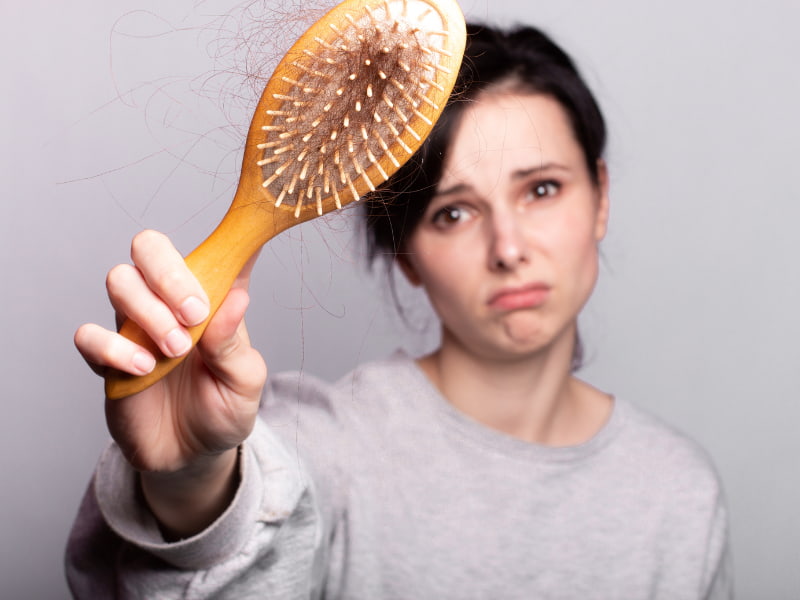
In summary, Telogen Effluvium is a temporary hair loss condition that can be managed effectively with proper care and treatment. By understanding its symptoms, causes, and treatment options, people can take the necessary steps to prevent and manage this condition.
One effective way to manage Telogen Effluvium is to take advantage of online dermatology consultation using Remotederm. Remotederm is an online dermatology service that allows patients to book appointments with board-certified dermatologists from the comfort of their homes. Through Remotederm, patients can upload photos of their scalp and hair, receive a diagnosis, and get prescriptions for their underlying conditionss. This is an excellent option for those who live in remote areas, have a busy schedule, or feel uncomfortable going to a clinic or doctor’s office.
FAQs
1. How can Acute Telogen Effluvium be triggered?
Acute Telogen Effluvium can be caused by a variety of factors, including surgery, childbirth, severe illness, or emotional stress.
2. Can Chronic Telogen Effluvium last for several years?
Yes, unlike Acute Telogen Effluvium, Chronic Telogen Effluvium can last for several years.
3. Is Telogen Effluvium a severe medical condition?
No, Telogen Effluvium is not a severe medical condition, but it can be distressing for those who experience it.
4. Should you consult with a dermatologist or hair specialist if you experience hair loss or shedding?
Yes, it’s important to consult with a dermatologist or hair specialist if you experience hair loss or shedding, as there may be other underlying causes that require different treatment strategies.
5. What is the difference between Acute and Chronic Telogen Effluvium?
Acute Telogen Effluvium is a form of Telogen Effluvium that occurs suddenly and is typically triggered by a traumatic event, while Chronic Telogen Effluvium is a long-term form of Telogen Effluvium that causes ongoing hair shedding or thinning.
